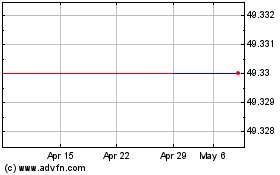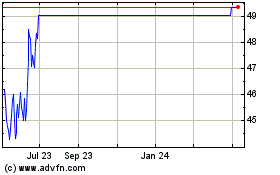Locus Robotics Raises $26 Million in New Funding Round
April 22 2019 - 7:14AM
Dow Jones News
By Paul Page
Locus Robotics Corp. raised $26 million in a Series C funding
round that will help the warehouse automation company expand the
reach of its robots, which help speed up the fulfillment of
e-commerce orders, into international markets.
The round increased to $66 million the funding the Wilmington,
Mass.-based company has raised since the business was spun out in
2015 from Quiet Logistics Inc. The new funding came from investors
including Zebra Ventures, the strategic investment arm of logistics
technology firm Zebra Technologies Corp., and Scale Venture
Partners, which led the company's last funding round in 2017.
Locus Chief Executive Rick Faulk said the company would use the
new funding to extend the company's business, which has placed
robots with customers in the U.S. including Deutsche Post AG's DHL
and France-based logistics provider Geodis, into Europe and develop
"next-generation robots."
"We will launch in Europe by midyear," said Mr. Faulk. "We're
effectively being pulled over there by our big accounts. And later
on we have opportunities in Asia. It's just a massive worldwide
market, with significant growth."
The Locus robots resemble motorized stools with shelving and
touchscreens. They operate in groups and use sensors to navigate
through warehouses as workers pick items and move on.
The robots are part of a new generation of automated tools known
as collaborative robots because they work with human staffers. They
come equipped with software that ties together inventory management
data and warehouse management systems to help the robots quickly
locate products in vast warehouses and figure out the fastest, most
efficient path to the goods. Locus says the robots can double the
efficiency of human workers by cutting the time workers spend
walking between shelves.
"We do that by surrounding a human with the robots, and we have
algorithms that dramatically decrease the walking time in a
building," Mr. Faulk said. "Instead of walking up and down aisles,
the human will work a zone and the robots will come to you."
Most warehouses still rely largely on people who pull carts
through the aisles, and even automated facilities like some of
Amazon.com Inc.'s vast fulfillment centers require hundreds of
workers to pick and pack goods for shipping.
But the market for logistics robots is growing as online sales
surge, pushing companies to fulfill orders faster for rapid
delivery, and a tight labor supply makes it harder and more
expensive to hire warehouse workers.
U.K.-based ABI Research said in a report last month that heavily
automated warehouses worldwide would grow from 4,000 last year to
50,000 by 2023 and would put some 4 million commercial robots to
work.
ABI Senior Analyst Nick Finill said in the report that the
automation helps companies that are coping with "volatile product
demand, seasonal peaks, and rising consumer delivery
expectations."
"Robots enable warehouses to scale operations up or down as
required while offering major efficiency gains and mitigating
inherent challenges associated with labor and staffing," Mr. Finill
said.
Amazon, which helped spur greater warehouse automation with its
purchase in 2012 of warehouse robotics company Kiva Systems,
stepped up its automation investment this month with the
acquisition of Boulder, Colo.-based Canvas Technology. The startup
also makes autonomous carts for warehouses.
The investment by Zebra adds potential new openings in the
automation sector for Locus.
Tony Palcheck, managing director of Zebra Ventures, said the
company was looking at how Locus robots can mesh in warehouse
operations with the scanners, industrial mobile computers, printers
and technology that Zebra provides.
"This is not only a financial investment for us, it is a
strategic investment," said Mr. Palcheck. "We see great
opportunities here to provide solutions for third-party logistics
companies and retailers. This is a perfect alignment with where
Zebra is going."
-- Jennifer Smith contributed to this article.
Write to Paul Page at paul.page@wsj.com
(END) Dow Jones Newswires
April 22, 2019 06:59 ET (10:59 GMT)
Copyright (c) 2019 Dow Jones & Company, Inc.
Deutsche Post (PK) (USOTC:DPSGY)
Historical Stock Chart
From Mar 2024 to Apr 2024

Deutsche Post (PK) (USOTC:DPSGY)
Historical Stock Chart
From Apr 2023 to Apr 2024
